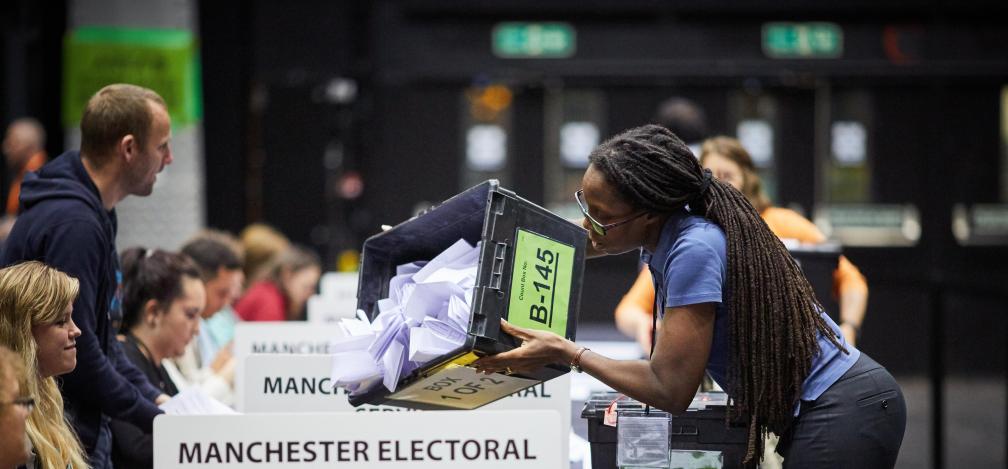Local elections 2024: Mayor of the North East
How was first mayor of the North East elected?

On 2 May 2024, Kim McGuinness was elected as the first mayor of the North East winning a total of 41% of the vote. McGuinness leads the new combined authority, which controls a £48 million annual investment fund and dedicated budgets for functions such as transport, skills, housing and culture.
What was the result of the 2024 mayor of the North East election?
Kim McGuinness was the winner of the May 2024 North East mayoral election. She represents the Labour Party and was previously police and crime commissioner for Northumbria (covering Northumberland and Tyne and Wear). 30 BBC News, ‘Kim McGuinness: Labour selects PCC as North East mayor candidate’, BBC News, 17 July 2023, retrieved 5 March 2024,www.bbc.co.uk/news/uk-england-tyne-66222422.
McGuinness’ highest share of the vote was 45% in County Durham, and her lowest was 36% in South Tyneside.
The turnout across the Combined Authority was 31%. Turnout for metro mayor elections has varied between 21% (Tees Valley 2017) and 36% (Cambridgeshire and Peterborough 2021).
North of Tyne Mayor Jamie Driscoll stood as an independent, after he was excluded from the Labour Party’s shortlist for the new mayoralty, despite having served as a Labour mayor since 2019. He secured 28% of the vote.
The Conservative candidate was Guy Renner-Thompson, a Northumberland county councillor. 31 BBC News, ‘Guy Renner-Thompson chosen as Conservative North East mayor candidate’, BBC News, 27 November 2023, retrieved 5 March 2024, www.bbc.co.uk/news/uk-england-67540915. The Green Party had Andrew Gray as their candidate, 32 Daniel Holland, ‘Green Party names Andrew Gray as North East mayoral candidate’, BBC News, 11 December 2023, retrieved 5 March 2024, www.bbc.co.uk/news/uk-england-tyne-67679230. the Liberal Democrats’ candidate was Aidan King, 33 BBC News, ‘North East mayor: Liberal Democrat Dr Aidan King to run’, BBC News, 16 January 2024, retrieved 5 March 2024, www.bbc.co.uk/news/uk-england-67990925. and the Reform Party candidate was Paul Donaghy. 34 BBC News, ‘Reform UK names Paul Donaghy as North East mayoral candidate’, BBC News, 15 January 2023, retrieved 5 March 2024, www.bbc.co.uk/news/uk-england-tyne-67979737.
What is the history of devolution to the North East?
Tyne & Wear County Council was abolished in 1986, leaving the region without an intermediate tier of government between local councils and central government. Several subsequent attempts to devolve powers to the region failed due to local political disagreements.
Labour proposed devolving some powers to a wider North East regional assembly in 2004, also covering the Tees Valley area, which now has its own devolution deal. These plans were abandoned after a referendum in which 78% voted against the proposals.
Negotiations between local leaders and government then took place in 2015 over a devolution deal that would have formed a mayoral combined authority for the region similar to those created in six other areas in 2017. 41 HM Treasury, North East devolution deal 2015, 23 October 2015, www.gov.uk/government/publications/north-east-devolution-deal Local disagreements – including over the mayoral model – led to the deal collapsing. 42 Halliday J, ‘Sajid Javid: devolution deal 'off the table' for north-east of England’, The Guardian, 8 September 2016, www.theguardian.com/politics/2016/sep/08/north-east-england-devolution-deal-off-the-table-sajid-javid
Three local authorities – Newcastle, North Tyneside, and Northumberland – then concluded a smaller devolution deal 43 Ministry of Housing, Communities, and Local Government, North of Tyne Combined Authority devolution deal, 8 November 2018, www.gov.uk/government/publications/north-of-tyne-combined-authority-devolution-deal that led to the formation of the North of Tyne Combined Authority (NTCA), headed by a mayor, Jamie Driscoll, who was elected in May 2019. A non-mayoral combined authority covering the rest of the region also continued to operate, but without holding significant devolved functions.
In February 2022, the government’s levelling up white paper committed to expanding the NTCA to include neighbouring Gateshead, South Tyneside and Sunderland, with Durham originally in line for a separate deal. 44 Department for Levelling Up, Housing, and Communities, Levelling up the United Kingdom, 2 February 2022, www.gov.uk/government/publications/levelling-up-the-united-kingdom Durham later joined negotiations for a single regional deal.
The new deal was concluded in December 2022, and will come into effect in May 2024 following the election of a new mayor. 45 Department for Levelling Up, Housing, and Communities, North East devolution deal, 28 December 2022, www.gov.uk/government/publications/north-east-devolution-deal--2
What is the North East Mayoral Combined Authority?
The North East Mayoral Combined Authority (NEMCA) is a legal entity formed of seven local authorities: Northumberland, Newcastle-upon-Tyne, North Tyneside, South Tyneside, Gateshead, Sunderland, and Durham.
Each is a ‘constituent member’ of the combined authority board, chaired by the North East mayor. A designated representative from each council (typically the council leader) can vote on all decisions. Representatives from the area’s business board and voluntary sector are non-voting members of the board. 46 North East Combined Authority, Scheme setting out proposals for the creation of a new mayoral combined authority for the North East area, no date, retrieved 4 August 2023, northeastca.gov.uk/wp-content/uploads/2023/01/NEMCA-Scheme-Proposals.pdf
The five urban constituent authorities are controlled by Labour, while Northumberland and County Durham are under no overall control. Northumberland has a minority Conservative administration, while a coalition of Liberal Democrats, Conservatives, independents and minor parties runs Durham County Council.
Each council had to vote to approve the creation of the NEMCA. A statutory instrument to formally establish the new authority was laid by the government on 7 February 2024.
The existing NTCA and the non-mayoral North East Combined Authority were abolished after the mayoral election took place.
What powers will the mayor and the combined authority hold?
As in other mayoral combined authorities, NEMCA holds devolved powers over transport, skills, planning and regeneration, and economic development.
Transport devolution is a central aspect of the expanded deal. While North of Tyne did not hold transport powers, NEMCA holds a range of transport powers including responsibility for the Tyne and Wear Metro light rail network, control of a long-term transport budget, and the ability to introduce bus franchising.
North of Tyne’s responsibility for adult skills provision was transferred to NEMCA, which now controls the adult education budget across the region. This provides funding for adult learners to achieve level two or three qualifications (equivalent to GCSE and A-Level).
The combined authority has the power to establish mayoral development corporations to aid in local regeneration, as well co-commission the delivery of affordable housing provision in the region alongside Homes England.
Combined authority mayors do not have strong personal executive powers. Most decisions require a majority vote of board members, and some decisions – such as the authority budget – require unanimity.
NEMCA’s powers are expected to grow over time. A commitment to negotiate an expanded devolution deal was included in the original 2022 deal. This deeper deal was announced in March 2024 and includes commitments to give NEMCA greater flexibility over spending and to support aspirations for NEMCA to become a ‘public sector innovation’ trailblazer. 48 Department for Levelling Up, Housing and Communities, ‘North East deeper devolution deal’, GOV.UK, 6 March 2024, retrieved 6 March 2024, www.gov.uk/government/publications/north-east-deeper-devolution-deal
Local and mayoral elections 2024
On Thursday 2 May, voters across England and Wales headed to the polls in a major set of mayoral and local elections. Keep up with our latest content, events and analysis on why these elections matter and the results when they come.
Find out more
How does the North East compare to the UK in terms of social and economic outcomes?
The North East underperforms the national average across several core economic indicators. Economic productivity and gross median weekly pay are both below the UK average, and while there is variation across the local areas, no area within the region meets the UK average on either measure.
The region also underperforms on adult skills. Only 54% of 16-64 year olds have a level three qualification or above, compared to 61% across the UK. Newcastle-upon-Tyne performs above the regional and national average, with 63% having a level three qualification. The lowest is Sunderland at 43%.
The NEMCA region has a lower proportion of houses (71%) that reach the decent homes standard than England as a whole (77%); this is true for every constituent council area.
Public transport use to get to work is highest in Newcastle upon Tyne (39%), but the region as a whole is below the national average. Unsurprisingly, the largely rural counties of Northumberland and Durham have the lowest rates on this metric.
How does NEMCA overlap with other administrative boundaries?
NEMCA will cover the same footprint as the North East local enterprise partnership, which is due to be absorbed into the combined authority as a business board.
However, NEMCA will not be coterminous with local policing areas; this means that the mayor will not be able to take on the police and crime commissioner role, which has happened in some other regions. The area’s NHS integrated care board also extends beyond the combined authority borders, covering the Tees Valley area as well as much of Cumbria.
- Topic
- Devolution
- United Kingdom
- England
- Position
- Metro mayor
- English Regions
- North East
- Combined authorities
- North East Combined Authority
- Publisher
- Institute for Government